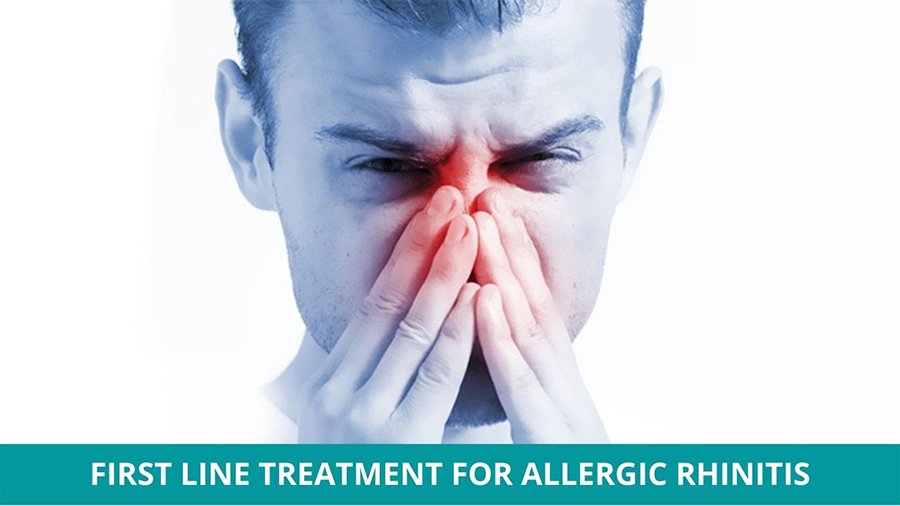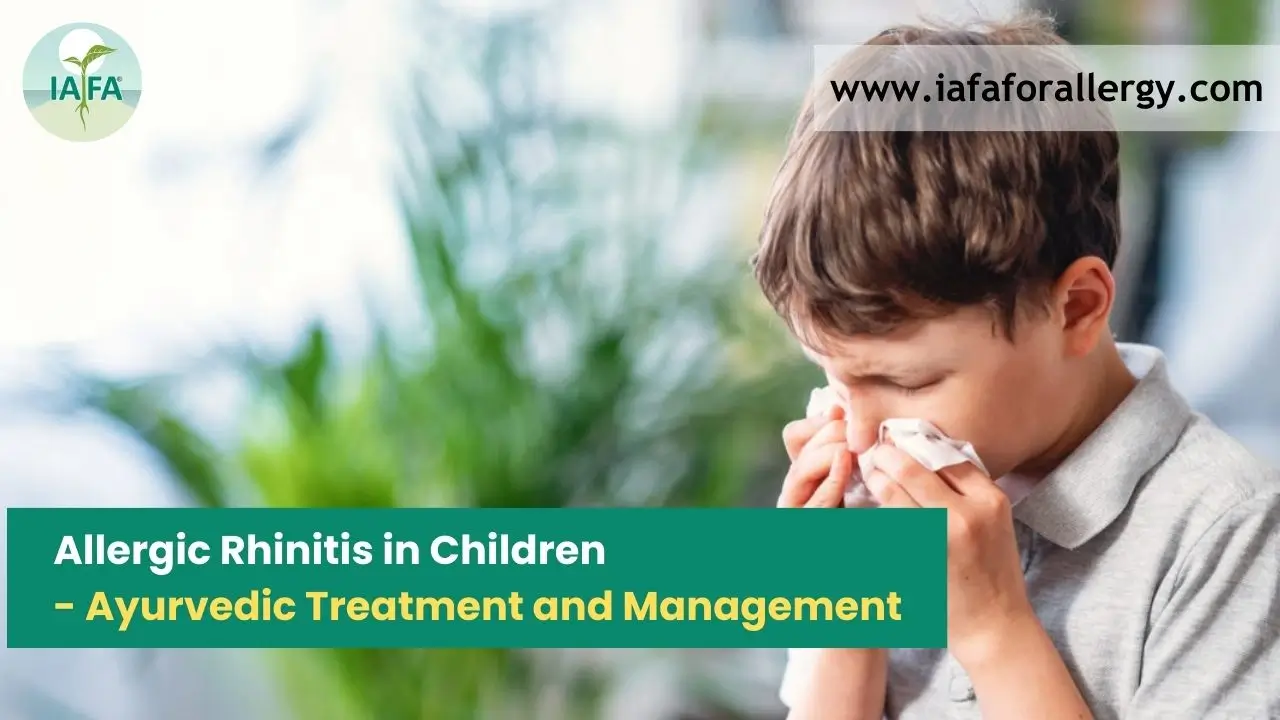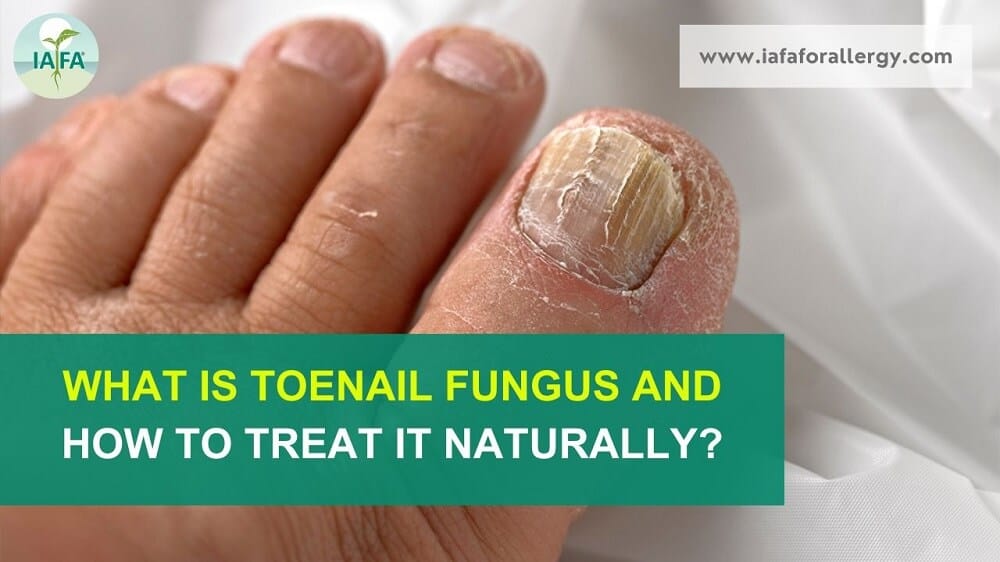Allergic Rhinitis is one of the prime disorders of the respiratory system found in all age groups which poses a great burden on the individual and the society. At present, treatment consists of oral and intranasal antihistamines, decongestants, intranasal steroids, etc. Due to fear of adverse effects of allopathic drugs, there is a need for an effective and safe treatment for treating the disease. In Ayurvedic texts, this disorder is correlated to Vata-kaphaja pratishaya and its symptoms and treatment have been explained in an elaborate manner. Various herbs, herbal remedies, and rasayanas are prescribed in Ayurveda that are safe, effective and do not cause any side effects. Institute of Applied Food Allergy® follows the core principles of Ayurveda and provides the first-line treatment for allergic rhinitis and it is the first Ayurvedic institution to treat food, skin and nasal allergies as well as fungal infections through Ayurveda measures.
What is Allergic Rhinitis?
Allergic Rhinitis is an immunoglobulin (IgE) mediated inflammatory disorder of the respiratory tract which is caused due to the inflammation of the airway mucosa with hypersensitivity resulting from seasonal or perennial responses to specific responses such as pollen, dust, mites, etc. It causes a significant physical and psychological health burden on the patients due to the chronic and prolonged nature of the disease.
In Ayurveda, Allergic Rhinitis can be compared with Vata – Kapha pratishaya. Agnimandya (low digestive fire) also contributes to allergic rhinitis as it causes the formation of Ama (toxins) in Amashaya. Simultaneously, Rasa-Raktavaha Sroto Dushti also takes place and finally the disease manifests.
Intake of wrong food combinations like taking fish with milk, clarified butter (desi ghee) with honey, ice cream after dinner, fruits with milk, etc. also predict allergic conditions because of the antagonist properties.
Master Sushrut in Sushrut Samhita has described Vataja pratishyaya in Nasagat rogas along with their complete aetiology, prodromal symptoms, prevention, diagnosis and treatment guidelines.
What are the Major Causes of Allergic Rhinitis?
The causes of allergic rhinitis are:
- Rajah Sevana (Exposure to dust)
- Ritu Vaish Maya (Change in climate)
- Dhooma Sevana (Pollution)
- Mandagni (low digestion strength)
- Virudh ahara (intake of wrong food combinations)
What are the Symptoms of Allergic Rhinitis?
The symptoms of Allergic Rhinitis are:
- Kshavathu (Sneezing)
- Aanadhwa (Nasal blockage)
- Tanusrava (Running nose)
- Swarbheda (Hoarseness of voice)
- Shirshoola (Headache)
Why do You Need to Treat Allergic Rhinitis?
Allergic Rhinitis is known for its recurrence and chronicity if not treated from its root. It limits routine activities, interferes with sleep, and also results in poor work performance. If it is ignored or not managed properly, it can lead to complications such as sinusitis, asthma, etc.
So, it is advisable to the patients that if proper Ayurvedic treatment under expert guidance is followed, then the best results in a short duration can be expected.
What is the Best Treatment for Allergic Rhinitis?
IAFA provides best Ayurvedic treatment for Allergic Rhinitis by prescribing herbal remedies that have Katu (pungent) and Tikta (bitter) rasa properties, Laghu (light) and Ruksha (dry) Guna (qualities), Ushna Veerya (hot potency), Katu Vipaka (undergo pungent taste conversion after digestion) and Vata Kapha Hara (vitiate vata and kapha doshas) properties. All these properties are very useful in removing the Sroto rodha (obstruction in various body channels) and promoting the expulsion of vitiated doshas.
These herbal remedies by IAFA have Agni deepan (stimulation of digestive fire) property as well.
The anti-inflammatory property of herbal remedies by IAFA reduces the inflammation of the respiratory tract and anti-bacterial property arrests the infection and prevents the recurrence of the disease.
All these above factors will ultimately lead to Vata-kapha pratishaya shaman without causing any adverse or toxic effects on the body.
Effective Herbs for Allergic Rhinitis
Some of the effective herbs for Allergic Rhinitis are:
- Turmeric (Curcuma longa): Curcumin present in turmeric alleviates the symptoms of allergic rhinitis such as sneezing and nasal congestion through reduction of nasal airflow resistance.
- Tulsi (Ocimum sanctum): The leaves of tulsi plant are rich in natural phytochemicals and antioxidants which strengthen the immunity and helpful in expelling phlegm from the throat.
- Yashtimadhu (Glycyrrhiza glabra): Yashtimadhu, commonly known as Mulethi is an excellent expectorant which can expel phlegm and therefore reduces allergic rhinitis, bronchial asthma, etc.
- Bhumi amla (Phyllanthus niruri): Bhumi amla is commonly used for digestive disorders as it is considered as a liver protecting herb. It is useful in treating fever, inflammation, etc. Bhumi amla is useful in treating indigestion, hyperacidity, jaundice and the juice of its leaves is used as nasal drops to treat cough, asthma, etc.
- Ginger (Zingiber officinale): Ginger is widely used in Ayurveda for stimulating the low digestive fire and preventing the formation of Ama (toxins). The formation of ama is one of the causes of allergic rhinitis. Ginger is useful for allergic rhinitis as it improves digestion strength, useful in respiratory tract infections, and improves digestion.
Herbal Remedies for Allergic Rhinitis
All the above-mentioned herbs are very effective for the natural and safe treatment of allergic rhinitis. The first-line treatment for allergic rhinitis offered by IAFA contains the combinations of effective herbal remedies prepared from these herbs.
IAFA provides both external therapies and internal ayurvedic medicines for the treatment of Allergic Rhinitis in adults as well as kids also.
Herbal Medications for Kids:
For External Use
- Nasal All Clear X Drops
- Nasayoga Grutham
Internal Medications
- Respiratory Care X Drops (for kids and children)
- Shishu Laxoherb Drops
- Respiro Detox Formula
Herbal Medications for Adults:
For External Use
- Nasal Air – Herbal Dhumapana Varti for Nasya Karma – Herbal Smoke
- Nasal All Clear X Drops
- Nasayoga Grutham
Internal Medications
- Total Care 3X Ras
- Respiratory Detox Tablets
- Respiro Detox Formula
- Curcumin with Piperine
- Res Chai-7
Diet and Lifestyle Recommendations in Allergic Rhinitis
Pathya (Do’s)
- Consume lukewarm water
- Intake of freshly prepared warm soups
- Intake of light and non-spicy food
Apathya (Don’ts)
- Milk and milk products
- Cold food and beverages
- Intake of non-seasonal fruits and vegetables
- Daily head shower
- Fermented food
Some yoga postures like Pawanmuktasan, Setubandhasan, Virabhadrasana, Trikonasana, Ardha Chandrasana are effective for Allergic Rhinitis.
Conclusion
Allergic Rhinitis is a chronic disorder. Hence, there is a need for early diagnosis and ideal Ayurvedic treatment under the guidance of expert Ayurvedic physicians. Book an appointment to consult an Ayurvedic Allergy Specialist of IAFA. IAFA is the ideal place for authentic Ayurvedic treatment of chronic disorders like Allergic Rhinitis.
References
- Charaka Samhita, Comm. Chakrapanidatta Ed. R.K. Sharma, Bhagwandash, Chowkhambha Sanskrit Series, Varanasi, 1984, Sutra Sthana 11/43.
- Sushruta Samhita Dalhana Commentary – Nibandha Sangraha, edited by Vaidya Jadavaji Trikamji Acharya, Chaukhamba Surbharti Prakashana, Varanasi, 2012, Sutra Sthana 1/15.
- Sharma PV, Dravyaguna vijnana – volume II, Varanasi, Uttar Pradesh, India: Chaukhambha Bharati Academy; 2001.
- Reference Book: Page No. 50-54 Ayurvedic Aspects of Allergies and Fungal Infection – Dr. Sahil Gupta (Author).








